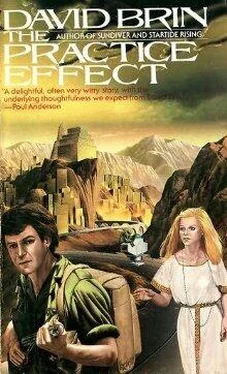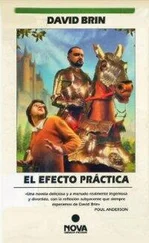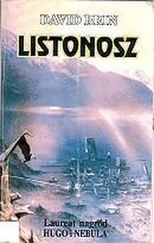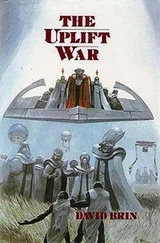David Brin - The Practice Effect
Здесь есть возможность читать онлайн «David Brin - The Practice Effect» весь текст электронной книги совершенно бесплатно (целиком полную версию без сокращений). В некоторых случаях можно слушать аудио, скачать через торрент в формате fb2 и присутствует краткое содержание. Год выпуска: 1984, ISBN: 1984, Издательство: Bantam Books, Жанр: Фантастика и фэнтези, на английском языке. Описание произведения, (предисловие) а так же отзывы посетителей доступны на портале библиотеки ЛибКат.
- Название:The Practice Effect
- Автор:
- Издательство:Bantam Books
- Жанр:
- Год:1984
- ISBN:0-553-23992-9
- Рейтинг книги:4 / 5. Голосов: 1
-
Избранное:Добавить в избранное
- Отзывы:
-
Ваша оценка:
- 80
- 1
- 2
- 3
- 4
- 5
The Practice Effect: краткое содержание, описание и аннотация
Предлагаем к чтению аннотацию, описание, краткое содержание или предисловие (зависит от того, что написал сам автор книги «The Practice Effect»). Если вы не нашли необходимую информацию о книге — напишите в комментариях, мы постараемся отыскать её.
The Practice Effect — читать онлайн бесплатно полную книгу (весь текст) целиком
Ниже представлен текст книги, разбитый по страницам. Система сохранения места последней прочитанной страницы, позволяет с удобством читать онлайн бесплатно книгу «The Practice Effect», без необходимости каждый раз заново искать на чём Вы остановились. Поставьте закладку, и сможете в любой момент перейти на страницу, на которой закончили чтение.
Интервал:
Закладка:
“From now on we take turns watching over Gath to make sure he can practice undisturbed,” he said as he stood up. “And we keep him supplied with wood to cut. We’ll discuss the rest of the plan later.”
The escape committee all nodded. As far as they were concerned, he was the wizard.
The guards called again and Dennis hurried to work. One of the punishments for tardiness was to have one’s personal property taken away. Though he now wore homespun like the others, he was allowed to keep his overalls, to “practice” them on his own time. The last thing he wanted was to have them confiscated.
Three hours after lunch, a bell was rung announcing the beginning of a religious service. A red-robed prison chaplain set up an altar near the castle postern, and the cry went out for the faithful to gather.
Those who did not participate had to keep working, so most of the prisoners downed tools at once and sauntered over. In spite of a spate of irreverent chuckles, the majority participated.
A few, such as the thief, Arth, remained at work in the garden, shaking their heads and muttering disapproval.
Dennis wanted to watch the ceremony. But he saw no way to attend as just a spectator. The parishioners bowed and chanted before a row of wooden and gemstone idols.
He finally decided to stay with Stivyung Sigel. For the last hour the two of them had been assigned to chopping wood, using caveman-type axes under a guard’s watchful eye.
“It doesn’t look like most of our fellow prisoners take the state religion too seriously,” Dennis suggested to Stivyung sotto voce.
Sigel flexed his powerful shoulders and brought his ax down in a great arc, sending splinters of wood flying in all directions. He looked incongruous chopping in Baron Kremer’s brilliant clothes, but this was all part of Sigel’s job. The overlord of Zuslik didn’t like his clothes to bind. After this practice they would be supple.
“Zuslikers used to be pretty easygoing about religion under the old Duke,” Sigel said. “But when Kremer’s dad and grandad marched in, they right off started grantin’ favors to the church and the guilds, which is funny, since the northern hillmen never were such great believers before that.”
Dennis nodded. It was a familiar pattern. In Earth history, barbarians often had become the fiercest defenders of the established orthodoxy after they had conquered.
He raised his ax and took a whack at his own log. The crude stone blade bounced back, hardly making a dent.
“I take it you’re not a believer, either,” he asked Sigel.
The other man shrugged. “All these gods and goddesses really don’t make a lot of sense. In the kingdom cities back east they’re losing their following. Some folk are even starting to pay attention to the Old Belief, like the L’Toff have followed all along.”
Dennis was about to ask about the “Old Belief” but the guard growled at them, “ ’ere now! Pray or woork, you two. Coot th’ gab!”
Dennis could barely follow the northman’s guttural accent, but he got the general drift. He swung his ax. This time he got a few chips to fly, though he didn’t fool himself that it was because the tool had improved perceptibly.
Even with the Practice Effect, this was slow going. He hoped young Gath was having better luck with the zipper-saw than he was having with this triple-damned hunk of flint!
2
For the following three evenings, while Gath or Sigel practiced the little saw under the blankets, Dennis snuck out of the shed and went for walks in the jailyard. He was usually tired by that time, but not so exhausted he couldn’t duck past the lazy guards at the inner checkpoint.
In addition to spending his days practicing axes and armor, he had been taking lessons in the Coylians’ written language. Stivyung Sigel, the best-educated of the prisoners, was his tutor.
Dennis had been forced to modify his initial opinion a little. These people did have a culture above the “caveman” level. They had music and art, commerce and literature. They simply had no “technology” beyond the late Stone Age. They didn’t appear to need any.
Anything nonliving could be practiced, so everything here was made of wood or stone or hide… with occasional scraps of beaten native copper or meteoritic iron, both highly prized. Still, it was a wonder what could be accomplished without metal.
Their alphabet was a simple syllabary, easy to learn. Sigel was educated after a fashion, though he had been a soldier and a farmer, not a scholar. He was a patient teacher, but he could shed only a little light on the origin of humans on Tatir. That, he said, was the province of the churches… or of legends. Stivyung told Dennis what he knew, though he seemed embarrassed telling what were essentially fairy tales to an adult. Still, Dennis had insisted, and listened carefully, taking notes in his little book.
Finally, Dennis reluctantly concluded the stories of origin were about as contradictory as they had once been on Earth. If there was some link between the two worlds, apparently it was lost in the past.
Dennis did note that some of the oldest legends—particularly those dealing with the so-called Old Belief—did speak of a great fall, in which enemies of mankind caused him to lose his powers over the animals and over life itself.
Stivyung knew about the tale because of his long association with the mysterious tribe, the L’Toff. It wasn’t much to go on. And perhaps it was just a fable, after all, like the stories Tomosh had told him about friendly dragons.
So Dennis pondered the problem alone. He scratched narrow lines of tensor calculus in his notebook in the twilight after supper. He hadn’t even begun to come up with a theory to explain the Practice Effect. But the mathematics helped to settle his mind.
He needed the focus of his science. From time to time he felt brief recurrences at that strange, lightheaded disorientation he had experienced upon first arriving at Zuslik and then again on his first day in the jailyard.
No author had ever mentioned, in all the fantasy novels he had read, how difficult it really was for a normal human being to adjust to finding himself, with his life in jeopardy, in a truly strange place.
Now that he was beginning to understand some of the rules, and especially now that he had comrades, he was sure he would be all right. But he still felt occasional chills when he thought about the weird situation he was in.
On his fourth evening in the camp, after he snuck past the inner post to walk in the dim twilight past the green shoots in the garden, Dennis heard soft music as he strolled.
The music was lovely. The anomaly calculation he had been working on unraveled like shreds of fog blown by a fresh breeze.
The sound came from above the far end of the prison yard. It was a high, clear, feminine voice, accompanied by some kind of harp. The instrument seemed to weep into the night, gently and with an electric poignancy. Dennis followed the music, entranced.
He came to the point where the new wall met the old. Two parapets above, strumming a pale, lutelike instrument, was the girl he had seen so briefly that night on the road, whom Stivyung Sigel had called Linnora—Princess of the L’Toff.
Sharp spiked wooden bars kept her imprisoned on her balcony. The gleaming rods reflected the moonlight almost as brightly as did the honey yellow of her hair. Dennis listened, entranced, though he couldn’t make out the words.
The lutelike instrument must have had generations of practice to achieve such power. Her voice filled him with wonder, though he could barely follow the accented words. The music seemed to draw him forward.
The girl stopped singing abruptly and turned. A dark figure had emerged from the dim doorway at the right end of the balcony. She stood and faced the intruder.
Читать дальшеИнтервал:
Закладка:
Похожие книги на «The Practice Effect»
Представляем Вашему вниманию похожие книги на «The Practice Effect» списком для выбора. Мы отобрали схожую по названию и смыслу литературу в надежде предоставить читателям больше вариантов отыскать новые, интересные, ещё непрочитанные произведения.
Обсуждение, отзывы о книге «The Practice Effect» и просто собственные мнения читателей. Оставьте ваши комментарии, напишите, что Вы думаете о произведении, его смысле или главных героях. Укажите что конкретно понравилось, а что нет, и почему Вы так считаете.












